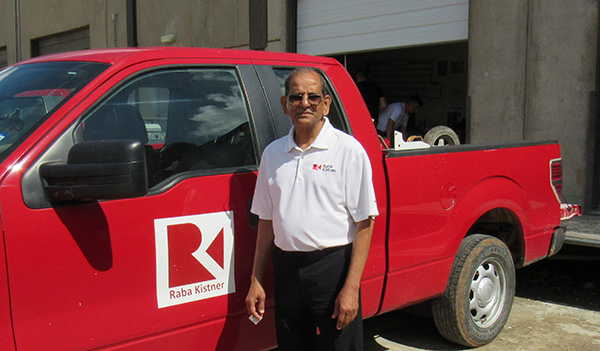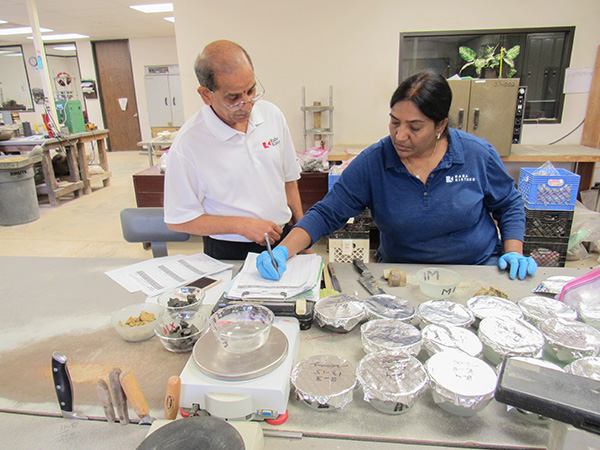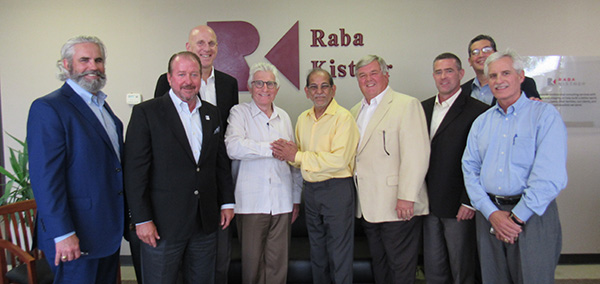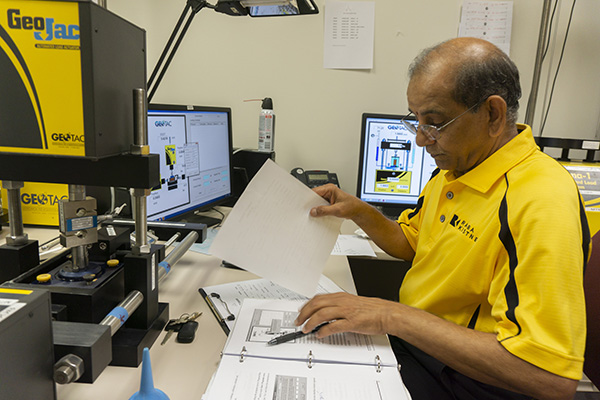We spent some time with Chainulu Chavali, Geotechnical Lab Manager, to learn more about his role and what it's like to work for Raba Kistner.
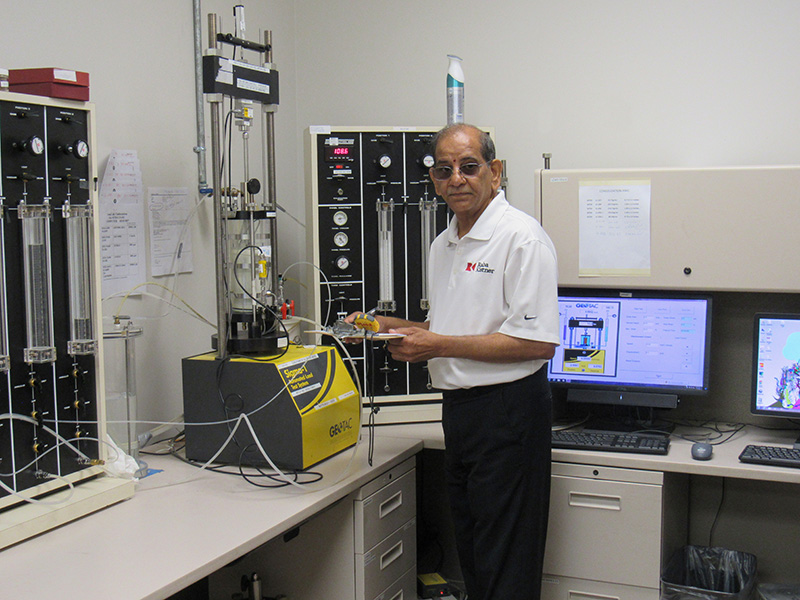
How long have you been with Raba Kistner and who do you report to?
I have been with Raba Kistner for 11 years, and I report to John D. Brown, P.E., Manager of Geotechnical Services.
What is your work dynamic like?
Work is always busy and I am constantly coordinating between our employees working in the lab and those in the field. The field technicians bring samples to the lab along with copies of the field logs. Test assignments are then made by the project engineer and provided to me, the Geotechnical Laboratory Manager. Test assignments assigned to our lab are then assigned a priority. Ensuring that projects are properly prioritized and test procedures are properly performed is an important part of my role. One of my first priorities when I arrive at work each day is to discuss ongoing and upcoming projects with my boss, John Brown, P.E., Manager of Geotechnical Services. He provides guidance, including on when there have been any changes to the priorities settled from the night before. According to that, we adjust our testing schedules to ensure that we can meet all of our clients’ deadlines.
How does our geotechnical work help our clients construct buildings?
When an architect for a client comes in with a proposal for a certain type of building that they want to build, they’ll begin by determining the location they would like to put it on. Our technicians will then go out to their site and collect numerous soil samples for testing. Identifying and understanding soil composition is a critical component to determine what kind of foundation and structural design will be required for their building to maintain structural security. Building foundations can shift over time, and that movement must be accounted for in their design. For example, highly expansive clay soil can be problematic for many buildings. Improperly managed clay soils beneath foundations can dry out in the summer and swell in the winter, which may cause structural issues over time. By working closely with architects, we are able to provide them an accurate assessment of the soil conditions underneath their build site, which helps them ensure their designs can withstand changing soil conditions.
What does the training that you provide to your lab technicians include?
Part of my job includes training all of the Lab Technicians in our geotechnical lab—not only to meet the ASTM (American Society for Testing and Materials) and Raba Kistner standards—but also to meet my standards. I want all of our lab technicians to be as knowledgeable and competent as possible.
The reason that I train Technicians to very high standards is because that if you don’t follow the standards once, you might not get consistent, accurate results. Every member of the lab is responsible for adhering to these standards. Every member of my team is provided with a training manual through the corporate office. I teach them with this manual, in combination with customized flow charts and hands-on training. Once they have completed training, they have to take an internal training test. Lastly, I continually evaluate their work to see if they continue to meet all of the standards, including mine, and are capable of running all of the necessary tests.
What are some of the maintenance responsibilities required for managing a geotechnical lab?
The lab’s schedule and my schedule are the same. The minute that I walk into the lab, I begin evaluating maintenance requirements on all the equipment in the lab to make sure there will be no interference with our testing workload. For example, the air compressors need to be drained on a daily basis. Once maintenance has been done, we have to remove the samples from evening storage. We have to shut down the oven, take down the temperature, and start the daily logs. I have to balance our maintenance requirements with the workflow to meet our clients’ priorities. We have to be able to deliver an accurate product in a timely manner so that our clients will be satisfied with our services.
(L-R) Geotechnical Lab Manager Chain Chavali working with Lab Technician Ramajyothi Mangichetty.
Would you like to recognize anyone specifically that works for you?
Yes! Ramajyothi Mangichetty has been with Raba Kistner for the last three years. She understands the concepts involved in testing very well, has learned quickly, and works very diligently. In one given day, she completes around 15 Plasticity Indices (PIs) tests, which is exceptional. She is constantly learning and she ensures that she follows proper sample preparation, which supports the quality and speed of her work. She is a good asset to the company and to our geotechnical lab.
What client market sectors have you been working with lately?
Lately we have been working with clients in the education, multi-family housing and infrastructure market sectors, but we’re certainly not limited to those market sectors and have been performing work across many other industries in Houston. Our Houston office has been growing rapidly, and I am excited to be able to support that growth through helping manage our geotechnical lab.
Raba Kistner’s Board of Directors thanked Chain for his dedication during a recent board meeting at our Houston office. (L-R): Gary Raba, D.Eng, PE, Chris Schultz, PE, PMP, Mike Daniel, Carl F. Raba, PE, PhD, Chainulu Chavali, Dennis Hirschbrunner, PE, Thomas Burr, Joe Irizarry and William Raba.
How did you get started in this industry?
I used to be a white collar guy. I was traveling around the world in a three piece suit. My kids were missing me and they wanted me to be home more. I felt it was time for a change. I approached Raba Kistner with the hope of building a career that would better suit my family’s needs. I was able to join the Construction Materials Engineering and Testing (CoMET) department and began learning at every opportunity. I moved from CoMET to our Geotechnical department and took on increasing responsibilities from there.
Why do you like what you do?
I like it because it is a challenge for me. I enjoy learning, and it was something that I challenged myself to learn because I had to provide for my family. I have spent many years learning, performing, and practicing the art of geotechnical testing. Now that I have become very experienced in this field, I am able to take satisfaction in my job because I know what I’m doing is as perfect as I can make it. I also enjoy being able to help educate others. There are many Raba Kistner employees that I have trained. I am very proud of them. I knew they would become an asset to Raba Kistner. I taught them what I know. What I have, they have. I am still teaching people. There are many people that are working in this building that I trained awhile back and they are still learning. Anyone who has worked with me knows that if they have questions, they can come back to me anytime. I enjoy being able to help those around me.
What have you been learning about from recent projects?
Most of what I have been learning from recent projects are new techniques. The testing goals are the same, but how we acquire results is new. I am learning how to use new technology that helps me complete my job more efficiently, instead of having to do it all by hand by myself. Thanks to our investments in the latest testing equipment, instead of taking down data for 35 minutes continuously during a test, the data will be actively recorded by our equipment during the test and is provided for review when the test concludes. I have more time to mentor our lab technicians and support our growing list of clients. We are able to adhere to the high testing standards, including my standards, while improving turnaround time and overall testing capacity for our clients.
How do Raba Kistner’s safety programs help keep you and your team safe?
Every Monday morning, and other times throughout the week, we receive safety bulletins from Michael McCarty, our Corporate Health and Safety Manager. We are able to recall the information from these bulletins easily, making it a habit to remember to recognize and avoid unsafe activities. I help ensure that everyone who works in my lab is aware of the potential hazards that are involved in our work. Safety is critical, and protecting my staff—and teaching them to protect each other—is my first priority.
Interested in an exciting and rewarding career? See all of our career opportunities here.













